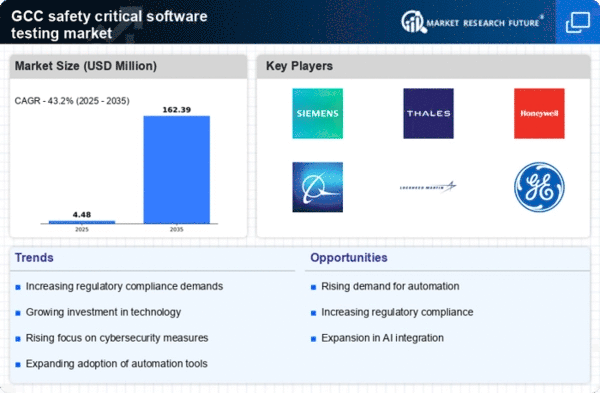Growing Focus on Risk Management
The growing focus on risk management within organizations is a crucial driver for the safety critical-software-testing market. Companies are increasingly recognizing the importance of identifying and mitigating risks associated with software failures, particularly in sectors such as energy and transportation. In the GCC region, the energy sector is projected to invest approximately $500 million in safety measures by 2027, highlighting the urgency of effective risk management strategies. This trend suggests that organizations are more inclined to adopt comprehensive testing methodologies to ensure that their software systems are resilient and reliable. Consequently, the safety critical-software-testing market is expected to benefit from this heightened emphasis on risk management, as businesses seek to protect their operations and stakeholders.
Technological Advancements in Testing Tools
Technological advancements in testing tools are significantly influencing the safety critical-software-testing market. The introduction of sophisticated testing frameworks and tools, such as model-based testing and simulation environments, enhances the efficiency and effectiveness of testing processes. In the GCC region, investments in technology are expected to reach $1.2 billion by 2026, reflecting a strong commitment to improving software quality. These advancements enable organizations to conduct more thorough testing, thereby identifying potential vulnerabilities and ensuring compliance with safety standards. As a result, the safety critical-software-testing market is likely to experience substantial growth, driven by the need for innovative solutions that can address the complexities of modern software systems.
Increasing Demand for Safety in Critical Systems
The rising demand for safety in critical systems is a primary driver for the safety critical-software-testing market. Industries such as aerospace, automotive, and healthcare are increasingly prioritizing safety to mitigate risks associated with software failures. In the GCC region, the aviation sector is projected to grow at a CAGR of 4.5% from 2025 to 2030, necessitating robust testing protocols. This trend indicates a heightened focus on ensuring that software systems operate reliably under all conditions. As organizations strive to comply with international safety standards, the need for comprehensive testing solutions becomes paramount. Consequently, this demand is likely to propel the growth of the safety critical-software-testing market, as companies seek to enhance their software reliability and safety measures.
Regulatory Pressures and Compliance Requirements
Regulatory pressures and compliance requirements are driving the safety critical-software-testing market as organizations strive to meet stringent safety standards. In the GCC region, regulatory bodies are increasingly enforcing compliance with international safety regulations, particularly in sectors like healthcare and transportation. For instance, the healthcare sector is expected to allocate around $300 million towards compliance initiatives by 2026. This regulatory landscape compels organizations to invest in robust testing solutions to ensure adherence to safety protocols. As a result, the safety critical-software-testing market is likely to expand, as companies seek to navigate the complexities of compliance while maintaining high safety standards in their software systems.
Increased Investment in Infrastructure Development
Increased investment in infrastructure development across the GCC region is a significant driver for the safety critical-software-testing market. As governments prioritize infrastructure projects, particularly in transportation and utilities, the demand for reliable software systems becomes critical. The GCC region is expected to invest over $200 billion in infrastructure projects by 2030, necessitating rigorous testing to ensure the safety and reliability of software used in these systems. This trend indicates a growing recognition of the importance of software quality in infrastructure projects, which is likely to boost the safety critical-software-testing market. Organizations will need to implement comprehensive testing strategies to mitigate risks associated with software failures in these vital sectors.
















